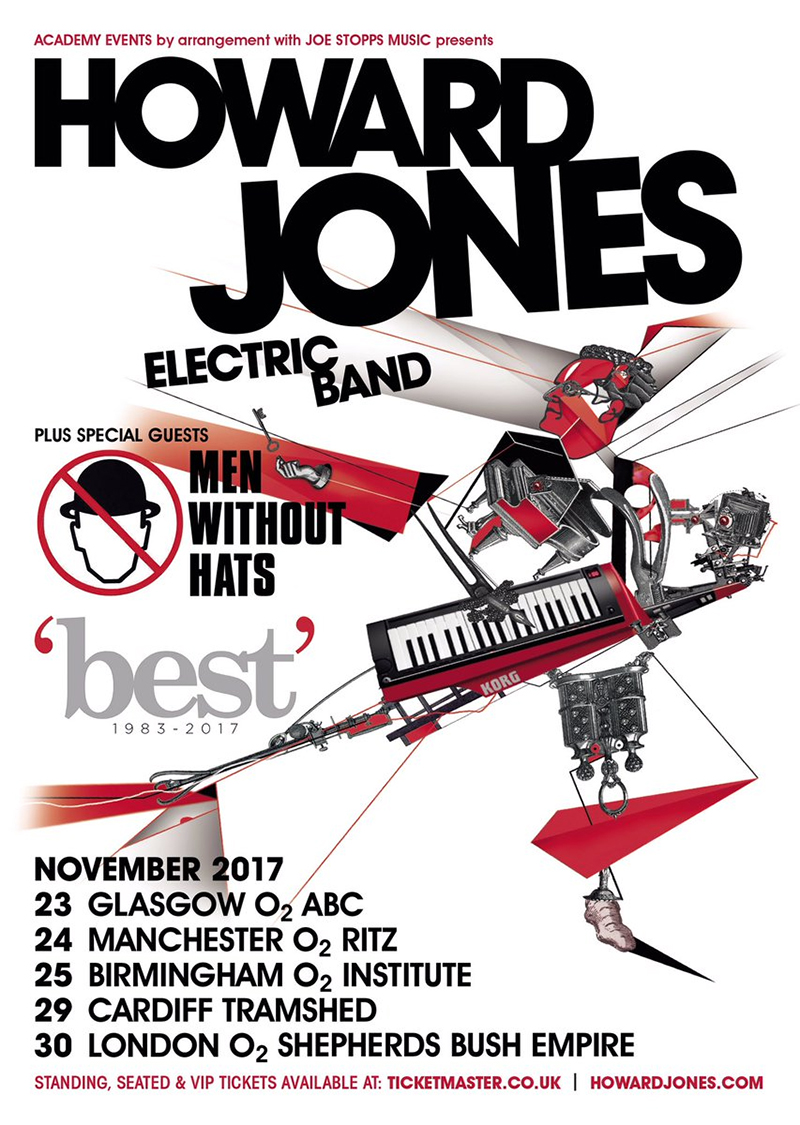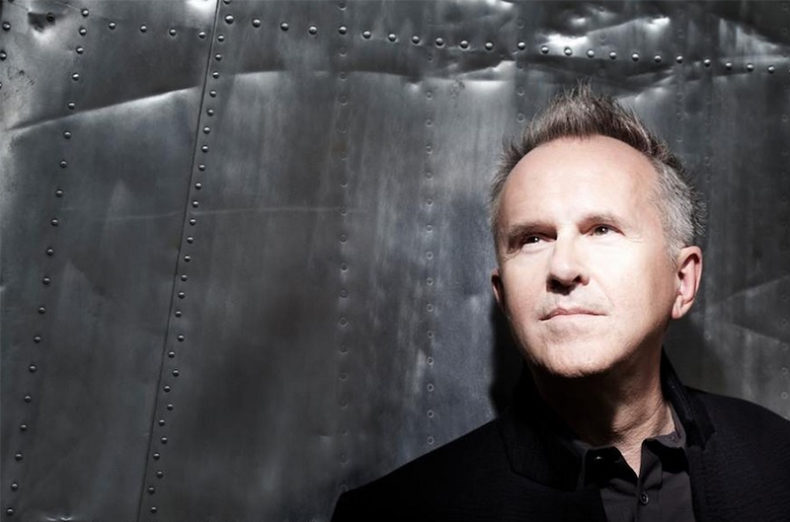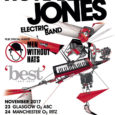LIKE TO GET TO KNOW YOU WELL
A CONVERSATION WITH HOWARD JONES
Howard Jones is a musician that achieved his biggest hits in the era of the eighties like so many other great artists. Unlike many other artists of that era, he has not vanished off the face of the earth. In 2017, he is still both releasing new music, and playing sold out shows all over the world. He is continuing to push both musical boundaries and visual/technology concepts. Next month, coming off the back of an extensive tour in America, he will be playing some selected UK dates with a different approach – billed the “Electric Band” shows he will be playing the five major UK cities: Glasgow, Manchester, Birmingham, Cardiff and London. Ahead of those very special shows, I was afforded the opportunity to gain a little insight into the career and life of the electronic musical legend. I was keen to find out from Howard himself what would actually be different about his shows in the UK on this particular set of live dates. I understand that his recently finished US dates also featured this format but would it be merely a case of replicating the set and visuals of that.Howard was keen to explain that the US dates had included a package of six bands and that his set on those shows had been just a short one hour duration. However on hitting the UK he will be playing a much longer set. The Electric Band shows had actually debuted with some UK festivals during the summer prior to the trip stateside, but it had just featured a short set of only forty five minutes.
On researching for the interview, I discovered that Howard had previously utilized a multi-media and technically unique concept for his previous album release Engage. I wondered if he would be employing a similar approach to playing live in the UK in terms of theatrics and visual stage presentation, or even would he seek to further develop the technical side even further. He explained that although the Engage project was very much a one-off, with only four shows around the world, he would still have be presenting a show with a lot of visual elements with the use of videos that he was constantly updating and working on to refresh them. The visual side of the production would remain a big part of the show. He elaborated that he had always had a direct input into that side of his art. He mentioned that quite a few of his videos had been done by the same person who is also an amazing photographer and together with Stephen Taylor, whom he recorded his first two albums with is a brilliant video guy. He also had creative input into the stage presentation.

As an artist who is keenly interested in utilizing technology and trying new ideas and concepts, I was particularly keen to gain an insight into how Howard felt about using the Pledge Music format. Had it lived up to his personal expectations or had it even failed to deliver on certain aspect? Would it be something that he would perhaps utilize again in the future? Howard concluded that his experience had been a positive one. It had given him the chance to be more creative about releasing an album in terms of not just being about the music. He did some artwork where he had written out song lyrics and then added some design around them. He did lots of those, and was also able to invite fans into the studio during the recording process. They were able to attend for an afternoon, where he was able to explain to them how the whole thing was put together, and to explore the thinking behind it. Fans were also given the opportunity to ask questions. Howard shared that he personally felt very responsible for delivering a quality service and product to them. He elaborated that as the fans personally pledged their money towards the project, it created a deep connection between himself and his own fans, which he really enjoyed. Nothing had yet been set in stone but he revealed that he would definitely recommend to other people do it.
Returning to the upcoming set of UK dates, I was keen to find out how an established artist like himself went about deciding and creating a set list before a tour. Howard stated that it didn’t get any easier, but it all depended on what type of show he was doing. With a festival audience, he explained that it’s more of a general audience so the set tended to be focused on the hit songs that people have long associated him with. However with the Live Band UK shows in November, he would expect some more hard core fans who would like to hear something a little different from what they had previously heard many times before. He said that he was trying to tread the line of also trying to maintain their interest as well. He stated that he will be slipping in many tracks that they wouldn’t expect to hear, and even some that he hadn’t played for a while, stating that set balance was “quite difficult, but I hope I do a reasonable job.” I sympathized with his artistic dilemma that as an artist obviously he would be keen to move forward rather than looking backwards. Howard added that he had quite a lot of new songs currently on the go and he would also try to incorporate some of those into the set,, in addition to a couple of tracks from Engage and maybe some obscure tracks from his first two albums.
As Howard had touched on the eternal set list dilemma, I was intrigued to how he viewed playing the eternal hits. Did he ever tire of representing particular songs which he had basically been serving up live to audiences since the eighties? Although those particular songs have a long standing place in many people’s lives, how could he attempt to explain their longevity and enduring appeal? Howard stated that it was down to the radio factor. ”I was very fortunate that people played them on the radio, and they still get played on the radio now, so people have a chance to reconnect with them constantly”. Growing up, Howard loved listening to the radio, and as such that was where he wanted his music to be delivered through as a medium. ”I love the idea that you could hear the music driving along in the car or doing the hoovering at home,and I still love the radio now. Fortunately they’re still playing it on the radio and people can reconnect with it.“
“There’s no single ambition
that I haven’t fulfilled. No,
I’ve been fortunate to do most of it”
Touring is an aspect of a band’s lifestyle that can either be regimented and uninspiring, or alternatively serve up the opportunity to experience many different cultures, and serve as an education. Howard highlighted that he had a particular fondness for Japan. He shared that he practiced a form of Buddhism which originates from Japan, so that had established his personal connection with that particular country. He bonded with its people, and he also loved the culture, in addition to liking the modernity of places like Tokyo. He still goes back once every two years, “I really need to go and be there.”
There have been many changes in the music industry from when Howard Jones had first set out to establish his career. Was he actually a person that embraced change, or instead rallied against it? ”I mean I set out right from the beginning to use the technology of the day. I didn’t want to look back and use what other people had done. So I tried to keep that going. Obviously when I started, I did the one-man electronic band, and used all the synths that were coming out, and you could buy them at the local music shop.” Over the years he explained that there is now amazing computer software available that you can also take out on tour. He wanted to stay on top of current technological changes and show people what is available without actually having a cluttered stage”
Reflecting on his career overall, Howard did not appear to have any personal career goals, hopes and dreams that remained unfulfilled. His primary focus was to continue, staying relevant with his new work and in new technology. ”There’s no single ambition that I haven’t fulfilled. No, I’ve been fortunate to do most of it.”
I often ask artists if there is a particular piece of music – a song by another artist that would still personally take you and move you to a different plain mentally even if you’ve listened to it hundreds and even thousands of times? Howard mused for several moments before stating that “I’m a big fan of Brian Wilson and there’s a song called “God Only Knows” that everybody should know. The best pop song ever written and I decided that I was going to learn it and play it on tour when I do my solo shows, and it’s a real incredible piece of work and yeah, so that one always moves me.” While discussing other artists’ enduring anthems, I was keen to find out how Howard himself viewed his own musical legacy. Was it something that he viewed with pride, or was there perhaps something in his discography that with the benefit of hindsight, he felt a little unhappy or ill at ease with. No skeletons in his closet, as Howard was happy to affirm “I stand by all the albums, and I’ve kept that policy going that I don’t let anything be released that I don’t think is 100% great, and if it’s not, it doesn’t make the album. So you try and keep the work and standard high, and yeah, that’s just been my approach. So looking back I can still feel very confident about playing any of them really.”

Regarding the changes in the industry, Howard tended to present a largely optimistic view of how the music evolution had gone. ”It’s incredible, the change. It’s so fast and so drastic. I mean we’ve gone from vinyl and cassette and CD, to a streaming culture now and it’s so, so, so different. Personally I love the streaming platform because you can access any music you can think of instantly on your phone, and I mean that’s an amazing thing to do. I mean the problem is that young artists are not able to make a living through their music being played, and that is a problem. That’s a problem for early work because if they can’t make a living, we’re not going to get all their great music that they can create and they’re going to have to get a part-time job and we don’t want that. So the music business needs to sort that out.” He didn’t feel that it was more difficult these days for established artists to make or seek alternative forms of revenue but he was however glad that he had the benefit of having a head start in the music business. He also shared that he had been assisting some young artists to get a grounding, so he was giving something back. Howard preferred to focus on the positives, stating that it was all about how people utilized the existing tools that are available. ”There are actually tons of opportunities”.
Wrapping up with my traditional interview closer, I asked Howard if he was given the opportunity in a role reversal scenario for himself to actually interview someone, who would that actually be? ”I would quite like to sit down with Obama I think. I think I’d find him to be a really inspirational character.”
Howard Jones, technically and technologically, is very much ahead of the game, but it was also nice to witness the man behind the machine.






